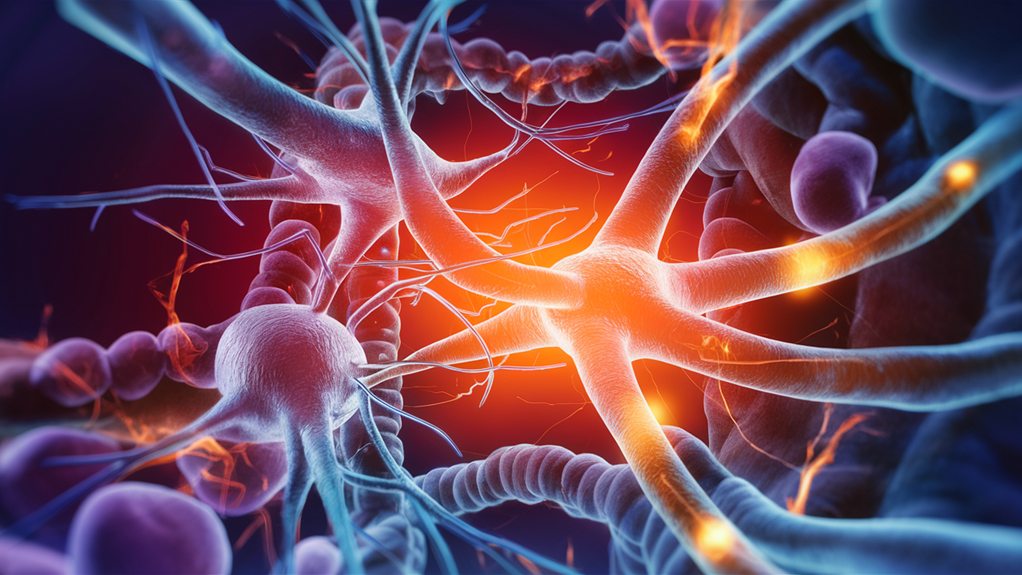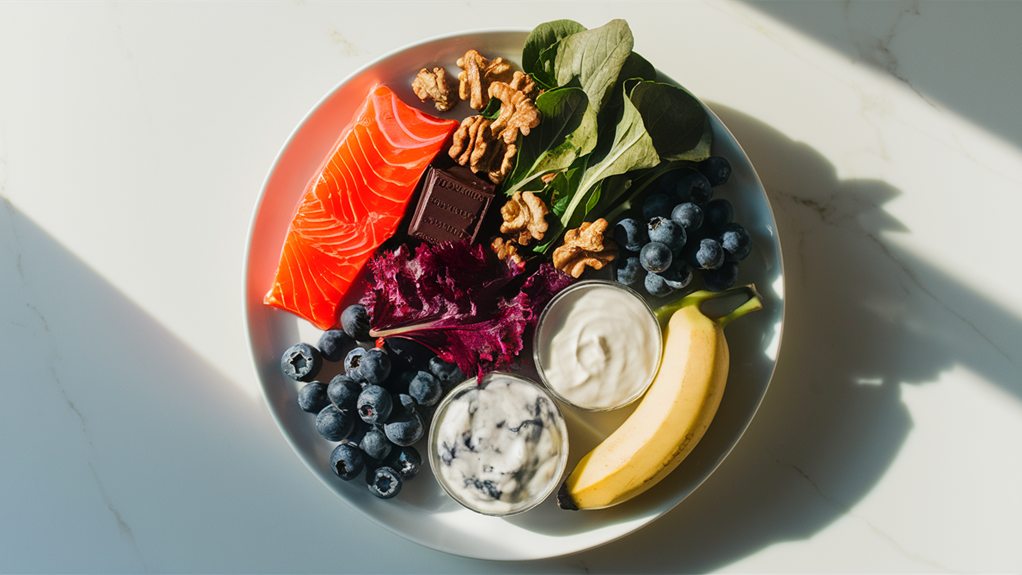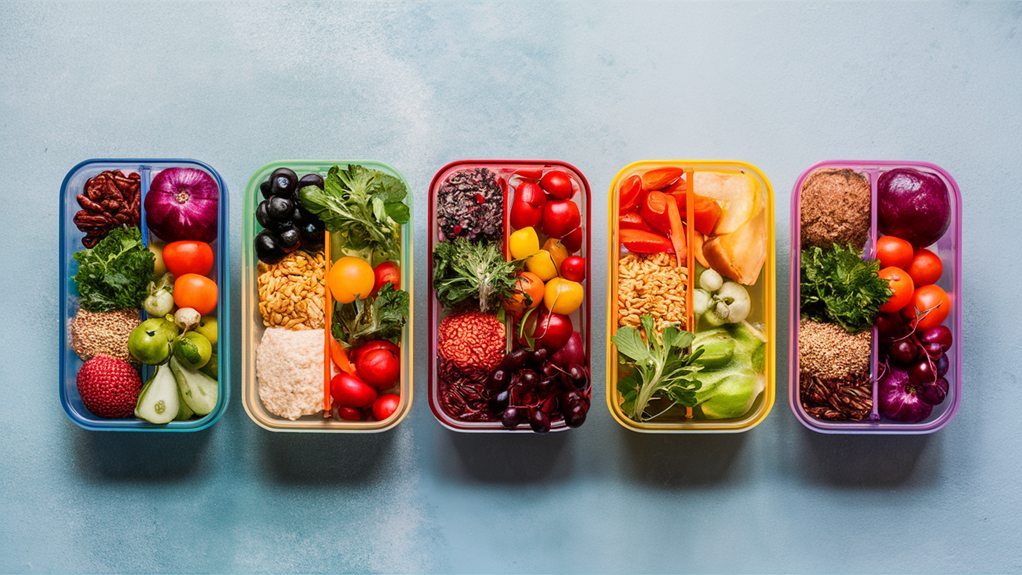Your nutrition choices have a profound impact on your mental well-being, influencing everything from your mood and energy levels to your cognitive function and emotional resilience. The gut-brain connection plays an essential role, as your digestive system produces important mood-regulating chemicals like serotonin. Vital nutrients, including omega-3 fatty acids, B vitamins, zinc, and magnesium, support brain health and emotional balance through foods like fatty fish, leafy greens, and whole grains. When you're feeling anxious or stressed, mood-boosting foods such as dark chocolate, berries, and fermented products can help stabilize your mental state. Understanding this connection between diet and mental health opens up natural ways to enhance your emotional wellness.
The Brain-Gut Connection

Your gut and brain maintain a complex two-way communication system that scientists call the gut-brain axis. This remarkable connection helps explain why your emotions can affect your digestion, and why your diet can influence your mood.
When you're studying nutrition for mental health, it's vital to understand that your gut produces many of the same chemicals your brain uses to regulate your emotions. Research suggests that a plant-based diet may provide essential nutrients that promote brain health and emotional well-being, further highlighting the importance of what you eat.
The food you eat directly impacts your mental health and food choices can either support or harm your emotional well-being. Your gut bacteria, which thrive on different types of foods, produce important neurotransmitters like serotonin, the "feel-good" chemical that helps regulate your mood.
When you're stressed or anxious, you might notice changes in your appetite or digestion, which shows how your diet and mood are interconnected. By eating a balanced diet rich in whole foods, vegetables, fruits, and healthy fats, you're not just feeding your body – you're nourishing your brain.
The nutrients from these foods help your gut bacteria produce the chemicals your brain needs to maintain emotional balance, reduce stress, and support overall mental wellness.
Essential Nutrients for Mental Wellness
Several key nutrients play an essential role in maintaining ideal mental health and emotional stability. Research shows that the link between diet and mental health is significant, influencing not just mood but also cognition and overall mental wellness.
When you're looking for foods that improve mood, you'll want to focus on options rich in omega-3 fatty acids, B vitamins, and minerals like zinc and magnesium. These nutrients work together to support your brain's natural chemistry and help regulate your emotions.
To boost your mental wellness, you'll need to incorporate vitamins for mental health into your daily diet. Foods like fatty fish, leafy greens, nuts, and whole grains contain essential compounds that your brain needs to function at its best.
For example, salmon provides omega-3s that help reduce anxiety, while spinach delivers folate that supports the production of feel-good chemicals in your brain. You'll also find that berries, rich in antioxidants, can protect your brain cells from stress-related damage.
Making smart food choices isn't just about physical health – it's a powerful way to support your emotional well-being. By including these nutrient-rich foods in your meals, you're giving your brain the tools it needs to maintain stable moods and clear thinking throughout the day.
Mood-Boosting Foods

Building on our understanding of key nutrients, specific foods can directly elevate your mood and mental state. When you're feeling down, reaching for dark chocolate, berries, or fatty fish can make a real difference in how you feel, thanks to their powerful mood-enhancing compounds.
Research shows that the diet-sleep-mental health link highlights how nutrition affects sleep quality and mood, further emphasizing the importance of what we eat.
You'll find natural mood boosters in foods rich in omega-3s, like salmon, mackerel, and walnuts, which help your brain function at its best. Fermented foods, including yogurt, kimchi, and sauerkraut, support your gut-brain connection and can improve your emotional well-being through beneficial probiotics.
Complex carbohydrates, found in whole grains and sweet potatoes, help regulate your serotonin levels, which is why you'll often feel calmer after eating them.
Don't forget about leafy greens, which are packed with folate and can help prevent feelings of depression. You can also turn to bananas, which contain vitamin B6 and natural sugars that'll give you sustained energy throughout the day.
When you're planning your meals, remember that colorful fruits and vegetables aren't just good for your body – they're essential for maintaining a positive mindset.
Common Nutrient Deficiencies
Over time, nutrient deficiencies can considerably impact mental health, even when symptoms aren't immediately apparent. Your brain needs specific vitamins and minerals to function properly, and when you're running low on these essential nutrients, you'll likely notice changes in your mood and cognitive abilities.
Particularly, key nutrients for mental wellness include omega-3 fatty acids and B vitamins, which are essential for maintaining emotional balance and cognitive performance.
Several key nutrients are commonly linked to mental health issues, including vitamin D, which you'll find is often low if you're not getting enough sunlight or eating fortified foods.
You're also likely to experience problems if you're deficient in B vitamins, particularly B12 and folate, which help regulate your mood and energy levels. Iron deficiency can leave you feeling exhausted and foggy-headed, while magnesium deficiency might increase your anxiety and affect your sleep quality.
You'll want to pay attention to omega-3 fatty acids too, as they're crucial for brain function and emotional stability.
If you're experiencing persistent mental health symptoms, it's worth checking your zinc levels, since this mineral plays an important role in neurotransmitter production and brain health.
Meal Planning for Mental Health

Smart meal planning serves as a powerful tool for supporting mental well-being through nutrition. Research indicates that certain dietary patterns, such as the Mediterranean diet, can positively influence mood and cognitive function, making thoughtful meal planning even more essential for mental health.
When you're struggling with anxiety, depression, or stress, having a structured approach to your meals can make a significant difference in how you feel throughout the day.
You'll want to start by planning three balanced meals and two healthy snacks each day, making sure to include foods that boost brain health. Begin your day with a protein-rich breakfast, like Greek yogurt with berries and nuts, which helps stabilize your mood.
For lunch and dinner, you should fill half your plate with colorful vegetables, a quarter with lean protein, and a quarter with whole grains.
Don't forget to schedule regular mealtimes, as this helps regulate your body's natural rhythms and stress response. You can batch-cook meals on weekends, which makes it easier to eat well when you're feeling low.
Keep a variety of mood-supporting snacks on hand, such as walnuts, dark chocolate, and fresh fruit. Remember to stay hydrated by planning your water intake throughout the day, as dehydration can affect mood and energy levels.
Creating Healthy Eating Habits
Good meal planning sets the foundation, but establishing consistent healthy eating habits turns nutritional knowledge into daily practice. Understanding the importance of energy balance is essential for maintaining not just physical health, but also mental well-being.
You'll find it easier to maintain good mental health when you create routines that support your nutritional needs, making healthy choices second nature rather than a daily struggle.
Start by setting regular mealtimes, which helps stabilize your blood sugar and mood throughout the day. You'll want to eat in a calm environment, away from screens and distractions, so you can practice mindful eating and truly notice your food's taste, texture, and your body's hunger signals.
When you're building new habits, it's helpful to prepare your environment by keeping nutritious snacks visible and storing less healthy options out of sight.
Don't forget to track your progress, but avoid being too rigid. You're aiming for sustainable changes, not perfection.
Make small adjustments, like adding an extra serving of vegetables to your lunch or switching to whole grain bread, and build on these successes gradually.



